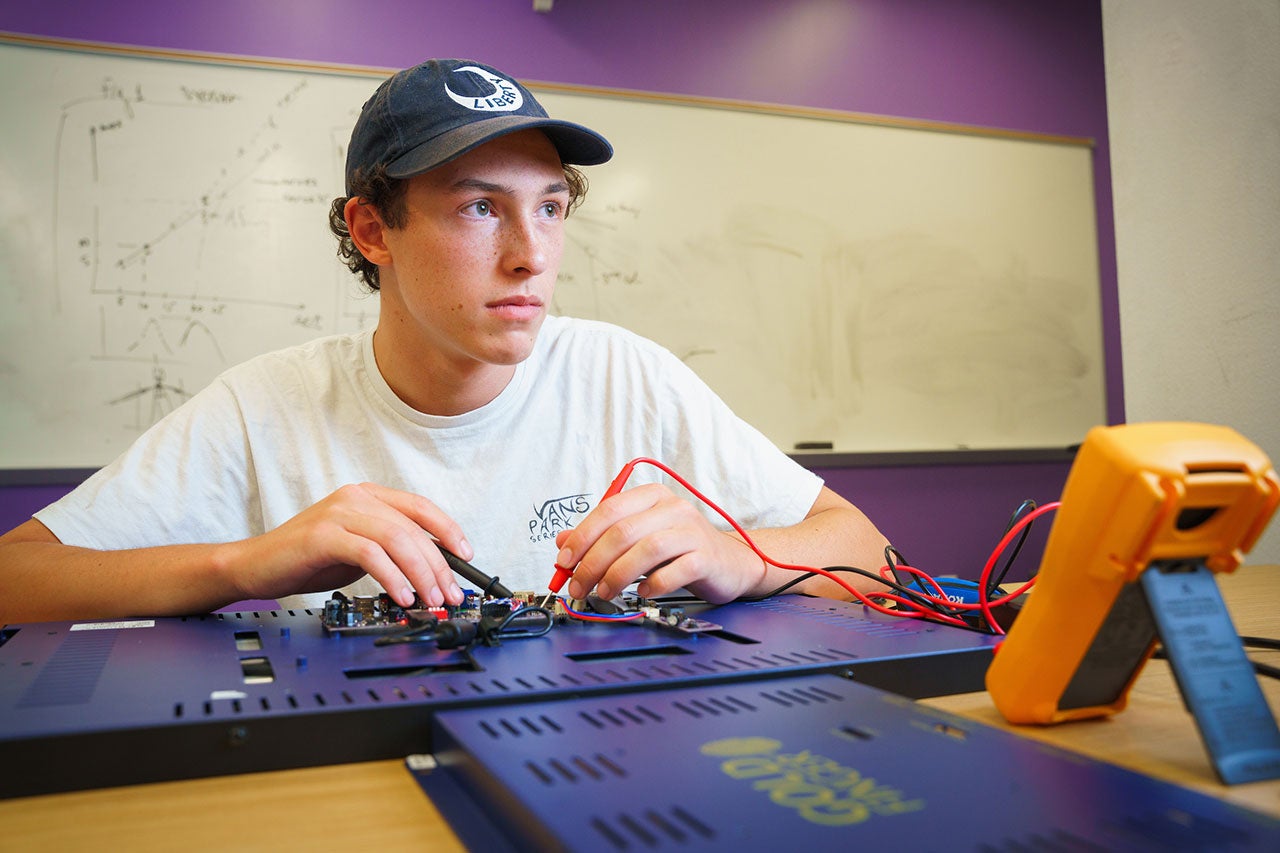Internships are all about getting hands-on experience, and rising College of Charleston sophomore Carter Blanton is certainly getting his fair share this summer, and not just because he’s working at touchscreen and monitor company Goldfinger.
The systems engineering major has produced CAD drawings, tested logic boxes and built motherboards. Goldfinger even gave him his own apartment above the shop on Johns Island, South Carolina, for the internship, which began in June 22 and will continue until the start of the fall semester.
“I’m just really glad to be here and learning amongst these great engineers,” says Blanton, who grew up in Spartanburg, South Carolina.
The College Today spoke with Blanton about what made him want to become an engineer, why he chose CofC and what he’s learning at the company that supplies touchscreens to the amusement, gaming and hospitality industries.
Why do you want to become an engineer?
I want to make the world a better place. I don’t like how the world’s going currently. I think that there are a lot of big problems that the next generation needs to solve, and I want to play a part in that in some way. The job description of an engineer is basically problem solver. My uncle is an automotive engineer, and he started giving me information about the engineering field and kind of coaching me throughout high school to start thinking more critically.
Why did you choose CofC?
I applied to a lot of colleges and got into Clemson and the University of South Carolina, but those engineering programs are so big, I didn’t feel that I could truly make my mark and be noticed as well as I could here. And as soon as I walked through the Cistern Yard, I just knew right then and there that this was it. It’s just so beautiful. Also hearing about the program from Dr. NK (Narayanan Kuthirummal, department chair for physics and astronomy and director of the Systems Engineering Program) and his explanation about systems engineering really drew me into the College’s program, too. A systems engineer puts all of the parts together, and I like to think big.
What do you enjoy most about the program?
The teachers. Professor Funke (Olufunke “Funke” Oladimeji) is amazing. She was the one who sent out an email about the internship. Also, the staff is so supportive. They want to do everything they can to help you.
Have you learned anything yet at CofC that you were able to apply at Goldfinger?
Yes, sir. I mentioned to one of the engineers at Goldfinger that I had a 3D printer, so they asked me to do a couple of CAD (computer-aided design) drawings, which is exactly what I just got finished learning about last semester. Having that knowledge really helped me to build upon some of the things that Goldfinger asked me to do.
Can you describe some of the different engineers you’re working with?
The project manager makes sure that everybody stays on task and reminds them when things need to be completed by. Our electrical engineer basically creates the motherboards for the monitors. Seeing him work is really interesting. I can watch him build a motherboard on the computer using CAD and then print it out on just a regular sheet of paper, place it on a board and then build it out. There’s also a software engineer. It was very interesting to see how he programmed this elaborate testing rig to check all the parameters that were needed. It’s incredible to see how much thought goes into every product, how they think about every single thing that can go wrong.
How will this internship help you in the future?
It will make me a better engineer. It’s fascinating to see how these guys work together to create the best product possible. It’s inspiring me to put it into my own work in the future. They taught me a lot about product reliability and that even when the product goes out, some things might go wrong, and as an engineer, you are in charge of what went wrong and you are in charge of finding a way to fix it. That’s very important as an engineer to know that. You’re responsible for anything that happens. Occasionally we’ll get a monitor back that either has a bad panel or a faulty touchscreen, so we have to find out what went wrong and fix whatever it was. It’s shown me how to make a better product.




